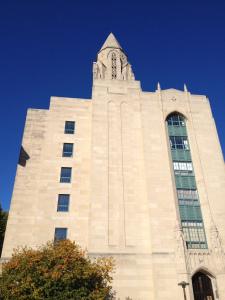Rather like an embarrassing personal blemish, many universities tend to hide the fact that they were originally servants of the church. Ouch! I know that hurts. When I was working at Routledge I had to educate some of my fellow employees about the strange interaction between religion and higher education. Most of the earliest universities were founded primarily as theological colleges. That stands to reason, since as light slowly began to dawn at the fading of the Dark Ages, the practice of literacy had largely been the domain of clerics, and even today, the clergy are among society’s most dependable readers. Universities sprang up because churches desired leaders who were informed—educated, even. Men (at that point) who knew how to reason well. This impetus eventually led to the kind of thinking that allowed science to emerge, although it soon had fights with its parents over who had the better perspective. Some things never change.

University or church?
Even considering the Ivy League here in the United States, we have schools that were generally founded for clerical purposes. Harvard was founded mainly to train Puritan ministers. Yale was intended to provide clergy and leaders to the colony of Connecticut. Brown was founded by Baptist clergy, while Columbia owes its origins to the missionary wing of the Church of England. Princeton was founded for the training of Presbyterian clergy. Dartmouth’s Puritan clergy founded wanted a school for preparing missionaries. Even non-sectarian Penn had clergy among its early leaders. Cornell was the lone gunman of the truly secular schools. The pattern even reaches to state universities that now cower at the thought of expanding or sometimes even maintaining their religion departments. Rutgers, where I had the privilege to teach as an adjunct for a few years, was originally founded as an enterprise of the Reformed Church in America, scion of the old Dutch Reformed Church, thus giving rise to the small New Brunswick Theological Seminary that still sits in the middle of the College Avenue Campus of the State University of New Jersey.
Every now and again, I ponder this state of affairs. Religion, love it or loath it, is foundational not only for higher education, but for civilization itself. If the evidence of Göbekli Tepe is to be believed, religion may have been the very glue that brought societies together in the first place. Despite the decline in mainline denominations, public survey evidence indicates Americans are just as religious as ever, or at least spiritual. How quickly we forget that it was biblical mandates to go out and spread the news that led to the idea of a literate, educated society. The lure of money and technology is great, and has managed to reshape the higher education landscape. If you look, however, at the lists of institutions of higher education in the United States, even today, the largest subset is either currently affiliated with, or had been founded by, Christian groups wanting to offer education to their children. Today there are still hundreds of universities and colleges affiliated with religious groups. Somehow I get the sense that the affection showed is not completely mutual.
